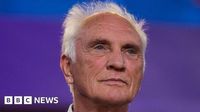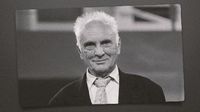Terence Stamp, the magnetic British actor whose striking presence and eclectic career made him a fixture in cinema for more than six decades, died on Sunday, August 17, 2025, at the age of 87, his family confirmed to Reuters. Known for his piercing blue eyes, chiseled features, and a talent that could swing from innocent vulnerability to icy menace, Stamp leaves behind a legacy that spans from the heights of Swinging London to the far reaches of Hollywood and beyond.
Born on July 22, 1938, in Stepney, East London, Stamp was the son of Ethel and Thomas, a merchant seaman. According to CNN, his father initially discouraged his ambitions for the stage, believing, “people like us didn’t do things like that.” Yet, his mother was quietly supportive, and Stamp’s determination eventually led him from grammar school and a brief stint in advertising to a scholarship at drama school. There, he began the journey that would make him one of the era’s most recognizable faces.
Stamp's breakout came in 1962 with his debut in Peter Ustinov’s adaptation of Herman Melville’s Billy Budd. As the naive young seaman, Stamp’s performance was lauded by critics and audiences alike. He earned an Oscar nomination for Best Supporting Actor and a Golden Globe for Best Newcomer, as reported by BBC. The New York Times described him as “perfect as Billy Budd, the innocent, trusting sailor who cannot comprehend wickedness.”
The 1960s saw Stamp become synonymous with the glamour and rebellion of the age. He starred in William Wyler’s The Collector (1965), playing the chilling kidnapper Freddie Clegg—a role that won him the Best Actor prize at Cannes. He continued to impress in John Schlesinger’s adaptation of Far From the Madding Crowd (1967), and in Ken Loach’s debut feature Poor Cow (1967). Stamp’s off-screen life was equally captivating, with high-profile romances with actress Julie Christie, supermodel Jean Shrimpton, and even Brigitte Bardot. The Kinks’ song “Waterloo Sunset” is widely believed to reference his relationship with Christie in the line, “Terry meets Julie.”
Known for his fashion sense and charisma, Stamp was at the center of London’s cultural explosion. Yet, fame’s fickle nature soon became apparent. As the 1960s faded, so too did some of Stamp’s opportunities. He spent time in Italy, working with directors like Pier Paolo Pasolini on the controversial Teorema (1968) and Federico Fellini on Spirits of the Dead. When offers slowed, Stamp bought a round-the-world ticket and found himself in India, where he spent years studying yoga and living in a spiritual retreat. “I thought if I could be good looking, and I could be successful and I could be famous, everything would be solved,” he later told BBC Radio 4’s Desert Island Discs. “When it all kind of came to an end, I thought to myself there’s been a lot of fun but there hasn’t been any real, deep internal satisfaction.”
Stamp’s return to the screen came with a bang—his most iconic role as General Zod in Richard Donner’s Superman (1978) and its 1980 sequel. His portrayal of the arch-villain, with the infamous command “Kneel before Zod,” became a defining moment in superhero cinema. Ironically, decades later, he would voice Jor-El, Superman’s father, in the TV series Smallville from 2003 to 2011, flipping his on-screen allegiance in a twist fans relished.
Throughout the 1980s and 1990s, Stamp’s career flourished with a mix of Hollywood and independent films. He played a morally upright financier in Oliver Stone’s Wall Street (1987), a mob informant in Stephen Frears’ The Hit (1984), and appeared in the cult favorite Young Guns. But perhaps his most surprising—and lauded—performance came in 1994’s The Adventures of Priscilla, Queen of the Desert, where he played Bernadette, a transgender woman embarking on a road trip across the Australian Outback. The role earned him BAFTA and Golden Globe nominations and, as BBC noted, “brought a convincing humanity to the character.” Stamp was reportedly set to return for a sequel, with director Stephan Elliott remarking in 2024 that Stamp, then 85, was “the fittest man I’ve ever met in my life.”
Stamp’s versatility was evident as he moved seamlessly between genres and continents. He appeared in Star Wars: Episode I – The Phantom Menace (1999) as Chancellor Valorum, and in comedies like Bowfinger (1999), where he lampooned Hollywood’s cultish side. Other credits included Red Planet, Full Frontal, My Boss’s Daughter, The Haunted Mansion, Wanted, Valkyrie (2008), and The Adjustment Bureau. He continued to take on challenging roles late into his career, with appearances in Tim Burton’s Big Eyes (2014), Edgar Wright’s Last Night in Soho (2021), and the TV series His Dark Materials.
Stamp’s personal life was as unconventional as his career. He married Elizabeth O’Rourke, an Australian pharmacist 35 years his junior, in 2002. The marriage lasted six years. His autobiography, Stamp Album, published in 1988, offers candid insights into his journey from East End obscurity to international stardom. He once reflected to The Guardian, “I’ve done crap, because sometimes I didn’t have the rent. But when I’ve got the rent, I want to do the best I can.”
Despite being approached to replace Sean Connery as James Bond, Stamp’s radical ideas about the character ultimately cost him the role. “I think my ideas about it put the frighteners on Harry [Saltzman],” he told BBC. “I didn’t get a second call from him.”
Stamp’s family, in their statement to Reuters, said: “He leaves behind an extraordinary body of work, both as an actor and as a writer that will continue to touch and inspire people for years to come.”
From his early days as a London heartthrob to his late-career turns as both villain and sage, Terence Stamp’s journey was anything but ordinary. His work, marked by risk, reinvention, and a refusal to be typecast, ensures that his influence will echo through the annals of cinema for generations to come.


